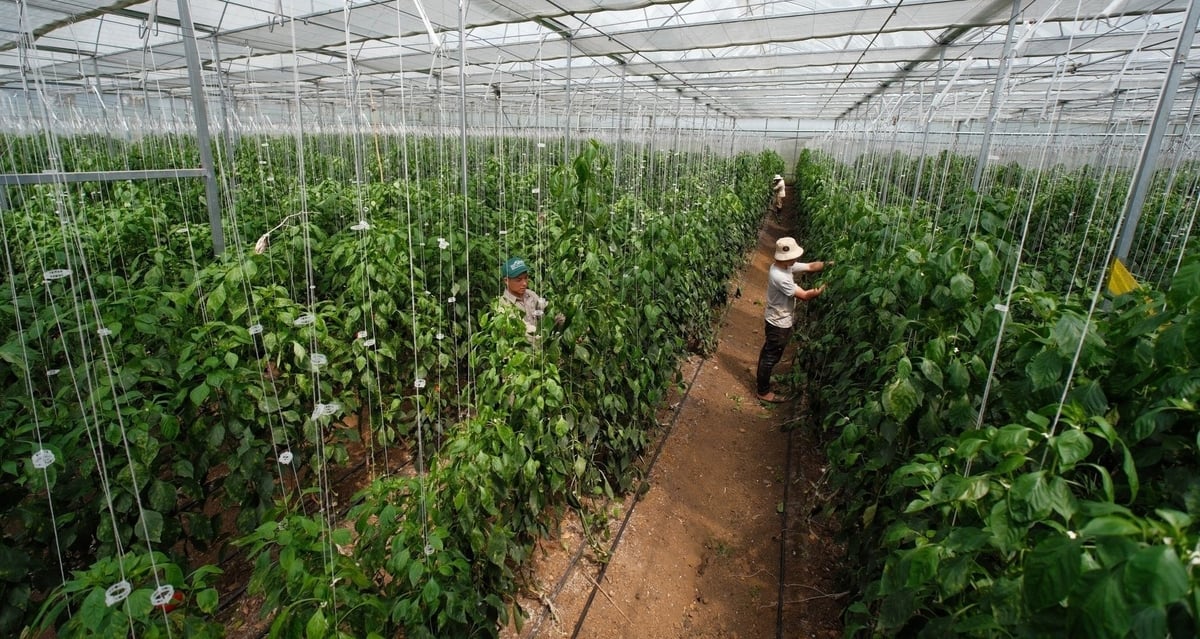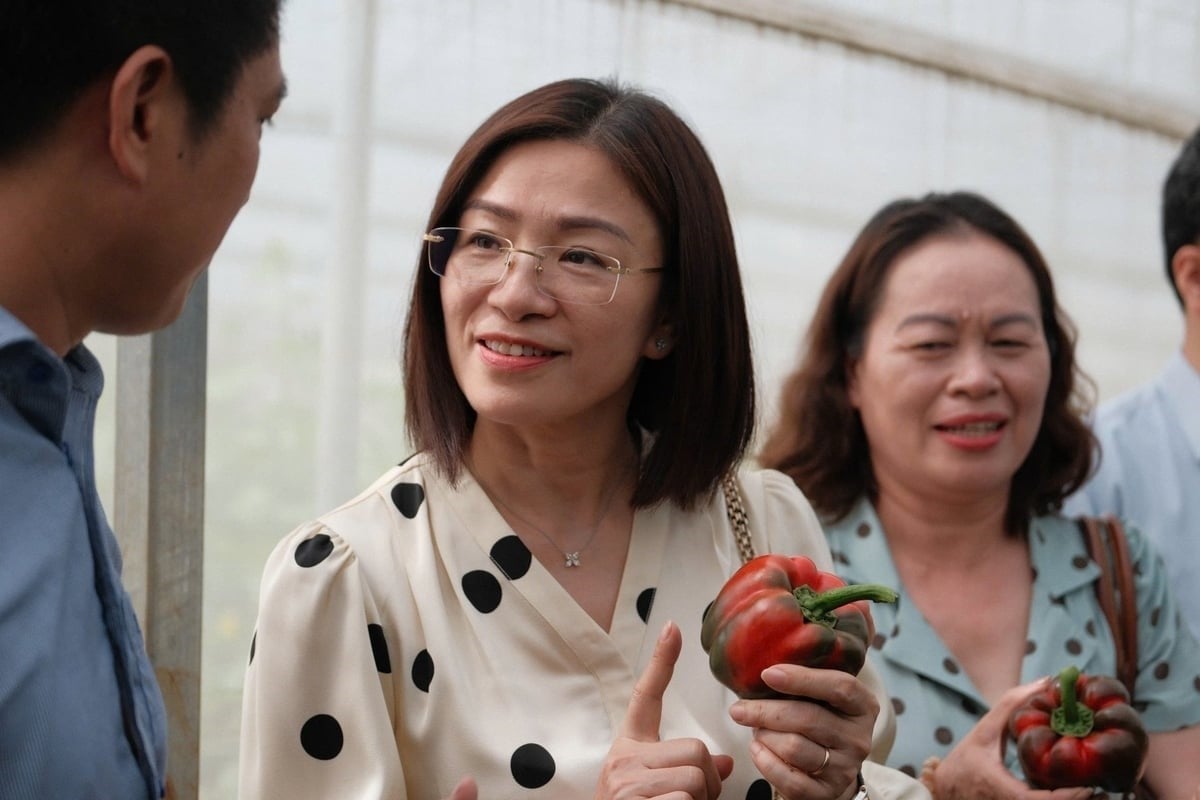November 6, 2025 | 13:56 GMT +7
November 6, 2025 | 13:56 GMT +7
Hotline: 0913.378.918
November 6, 2025 | 13:56 GMT +7
Hotline: 0913.378.918
Recently, in Moc Chau town (Son La province), the Food and Agriculture Organization of the United Nations (FAO) held a meeting to summarize the "Smart Farming for the Future Generation" project. Funded by the Government of the Republic of Korea through FAO, the project was implemented by the Fruit and Vegetable Research Institute under the Vietnam Academy of Agricultural Sciences in Son La.

Mr. Nguyen Song Ha, Assistant Representative of FAO in Vietnam (left), and Dr. Nguyen Quoc Hung, Director of the Fruit and Vegetable Research Institute, co-chaired the meeting. Photo: Quynh Chi.
Over the past 4 years, the project has supported the upgrading and renovation of approximately 4 hectares of high-tech greenhouses, including 32 production houses, 3 nurseries, and a demonstration model for local farmers to visit and learn from.
Thanks to the introduction of new techniques and technologies, vegetable production in greenhouses has seen impressive growth, from around 1.5 hectares in 2021 to nearly 50 hectares in 2024.
Mr. Kim Meyong Won, Representative of the Korea Rural Community Corporation in Vietnam, emphasized, “This project has become a typical model for cooperation among FAO, South Korea, and Vietnam through the introduction and application of advanced greenhouse technologies compatible with the socio-economic and environmental conditions of Moc Chau.”
Mr. Kim Meyong Won also acknowledged the strong interest from local farmers in this model, which far exceeded FAO's initial expectations. Notably, despite the project supporting only 50% of costs for selected farms, many farmers proactively participated and invested further to apply new technologies.
All project results and infrastructure have now been officially handed over to the local government. Mr. Kim expressed his hope that these models will continue to be effectively maintained, delivering practical and long-term value to farming communities.
According to Mr. Nguyen Song Ha, Assistant Representative of FAO in Vietnam, the project has achieved remarkable results. Sustaining and scaling up the project's smart farming methods is essential to creating long-term impacts across the Moc Chau plateau.

Tan Lap High-Tech Cooperative (Tan Lap commune, Moc Chau town, Son La province) is among the beneficiaries of the project. Photo: Quynh Chi.
“Farmers have been introduced to post-harvest preservation techniques that ensure food safety, as well as vegetable grafting methods that improve resistance to pests and diseases. In addition, we have demonstrated hydroponic farming, cultivation using growth media, and the use of natural enemies for pest management,” shared Mr. Nguyen Song Ha. According to his assessment, the project's results have contributed to shaping a sustainable agricultural value chain.
Mr. Ha Van Tien (54 years old), Director of Moc Van Trang Cooperative, is one of the outstanding farmers in the project. Reflecting on the 4-year journey, Mr. Tien expressed his gratitude to the team of experts and voiced his belief that farmers will have opportunities for more sustainable economic development through the application of the project’s new technologies.
Through his participation in the project, Mr. Tien gained access to advanced techniques such as greenhouse cultivation, drip irrigation systems, and the measurement of EC and pH levels in the soil. Thanks to these improvements, production efficiency has seen a clear improvement, with increased yields, better agricultural product quality, and higher selling prices compared to outdoor farming. Notably, under the dedicated guidance of project experts, local farmers have gradually mastered high-tech agricultural techniques.
Acknowledging insights from both experts and local farmers, Ms. Pham Thi Doan, Director of the Son La Department of Science and Technology, affirmed the project’s alignment with the province’s agricultural development strategy in the context of the Politburo’s Resolution No. 57-NQ/TW on breakthroughs in the development of science and technology, innovation, and national digital transformation.

Ms. Pham Thi Doan, Director of the Son La Department of Science and Technology, visits a high-tech bell pepper greenhouse model under the project in sub-zone 14, Moc Chau town. Photo: Quynh Chi.
“Son La is a province with a vast agricultural production area. Therefore, integrating technology into the agricultural value chain is the province’s focus. The project has achieved high efficiency across the entire value chain, enabling farmers to access quality plant varieties, scientific cultivation processes, and effective market connection. This success is largely thanks to the synchronous application of science and technology. I hope that the results achieved in Moc Chau will continue to be improved, serving as a foundation for replicating high-tech agriculture models in other localities across the province,” Ms. Doan said.
In the context of continuous innovation in agricultural technologies, greenhouse farming is emerging as a highly promising direction. However, for sustainable development, crop experts recommend that Moc Chau farmers need to be patient, follow methodical cultivation practices, and continue to build on the knowledge gained through the project.
Dr. Nguyen Quoc Hung, Director of the Fruit and Vegetable Research Institute, states that the achievements of the project have helped establish a concentrated high-tech vegetable production area, transforming Moc Chau into the “second Da Lat.”
Translated by Thu Huyen

(VAN) More than 400 experts from domestic and international organizations attended the ACT Con 2025 conference, which aimed to connect technology developers with frontline conservation teams.

(VAN) Food irradiation technology is an innovative solution that extends shelf life and acts as a ‘golden visa’ enabling Vietnamese agricultural products to access the world’s most demanding markets.

(VAN) At Dinh My commune (An Giang province), Loc Troi Group recently organized Mini Expo 2025 under the theme ‘From technology to practice – Comprehensive cultivation solutions for crops.’
/2025/11/04/2510-4-162016_246.jpg)
(VAN) The launch of the 'Carbon for Good' project in Lai Chau opens up a new direction in forest management and protection, laying the foundation for developing carbon credits.

(VAN) Hai Phong is implementing a comprehensive greenhouse gas inventory program, promoting sustainable and eco-friendly development.
/2025/11/01/5020-0-nongnghiep-235014.jpg)
(VAN) According to the FAO Representative in Vietnam, innovation for a sustainable food future must stem from fresh ideas of young people who dare to think differently.

(VAN) The adoption of LED lighting technology in fishing operations is expected to help local fishermen cut fuel costs, boost catch efficiency, and progressively modernize their fishing fleets.